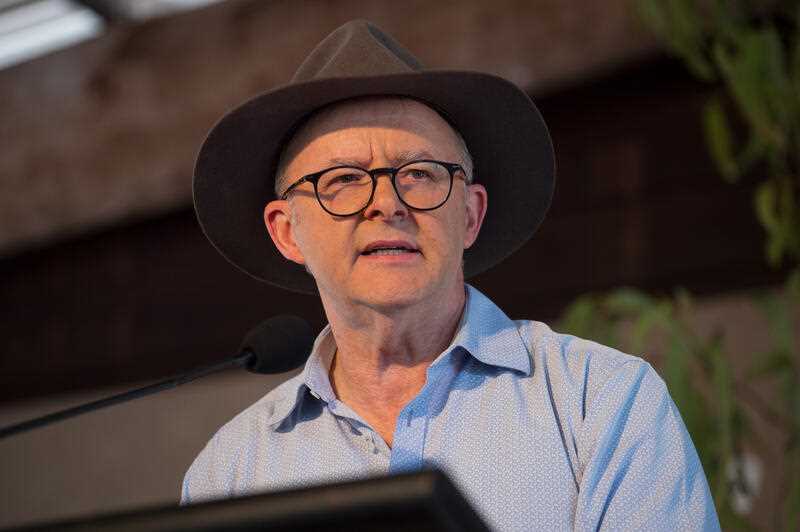The Northern Territory government will restrict the sale of alcohol in Alice Springs amid a surging youth crime crisis that has left many in the community calling for federal intervention.
Prime Minister Anthony Albanese visited the remote city on Tuesday, where he met with the territory government, the local council, community groups, police and frontline services providers.
“We have some significant announcements to make, but also some foreshadowing of future activity to deal with the pressures which clearly have been felt here in Alice Springs,” the prime minister told reporters.
He was joined by Indigenous Australians Minister Linda Burney, who along with NT Chief Minister Natasha Fyles, announced a series of measures that are designed to curb the violence and anti-social activity.
They included a three-month ban on the sale of takeaway alcohol in the region on Mondays and Tuesdays and reduced trading hours on other days, with a limit of one purchase per person each day.
A long-term central Australian alcohol management plan will also be developed to deal with the “complex issues” in the region, which include alcohol fueled violence, unemployment and youth on the streets.
A central Australian regional controller has been appointed to ensure all levels of government are working together to deliver services to the community.
The controller, Dorrelle Anderson, will also review opt-in alcohol restrictions, that replaced expired Intervention-inspired liquor bans last year, and consider if opt-out bans should be implemented.
Mr Albanese promised to spend millions of extra dollars to bolster security, including better street lighting, provide emergency accommodation for domestic violence victims and continue community services in Alice Springs and the region.
NT Chief Minister Natasha Fyles took aim at Opposition leader Peter Dutton, who she accused of playing politics with the issue.
“(He) was a part of the coalition cabinet that sat there and let the Stronger Futures law lapse in the Northern Territory, yet over the last few weeks he’s played politics with this issue without even visiting,” she said.
Earlier, Ms Fyles said alcohol and dysfunctional remote communities were to blame for Alice Springs youth crime issues.
However, she said another Howard-era intervention with sweeping booze bans and welfare controls was not the answer.
“I don’t believe we need federal intervention from the police or the military.” she told Sky News.
Alice Springs traditional owner group Lhere Artepe Aboriginal Corporation said decades of “chronic and systemic neglect” in remote communities had fuelled the crisis, which was “out of control”.
“The men, women and children on the streets of Alice Springs are rarely (local) Arrernte people,” chief executive Graeme Smith said.
“They are almost all from bush communities where they live in third world conditions with no future and little hope.”
He said for many, Alice Springs streets were better than their own “crowded, broken and impoverished” communities.
Alice Springs school principal and town councillor Gavin Morris said some children were on the streets because homes were unsafe.
“No one is going back to a community that doesn’t have power and water and basic infrastructure,” he told ABC News.
“They come to Alice Springs to get basic service around health and education.”
NT Police Commissioner Jamie Chalker said he would welcome any federal support, including more police, but strongly rejected the deployment of the defence force to impose martial law.
“We cannot arrest our way out of this,” he said.
“There’s a lot of services that just simply are not available on the ground in these remote communities.
“You add alcohol consumption into the mix and family tensions and then we’re dealing with the fallout of that too.”
Opposition Leader Peter Dutton branded it “the biggest issue in our country today”.
“There are reports of kids running around with machetes, children not wanting to go back home because they feel it’s unsafe to stay there so they’re out committing crimes,” he said.
“It’s a law and order and crime problem.”
By Dominic Giannini in Canberra



